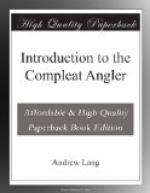Thus Donne made ready to meet the common fate:—
’That body, which once was
a temple of the Holy Ghost, is now become a
small quantity of Christian ashes.
But I shall see it reanimated.’
This is the very voice of Faith. Walton was, indeed, an assured believer, and to his mind, the world offered no insoluble problem. But we may say of him, in the words of a poet whom he quotes:—
’Many a one
Owes to his country his religion;
And in another would as strongly
grow
Had but his nurse or mother taught
him so.’
In his account of Donne’s early theological studies of the differences between Rome and Anglicanism, it is manifest that Izaak thinks these differences matters of no great moment. They are not for simple men to solve: Donne has taken that trouble for him; besides, he is an Englishman, and
‘Owes to his country his religion.’
He will be no Covenanter, and writes with disgust of an intruded Scots minister, whose first action was to cut down the ancient yews in the churchyard. Izaak’s religion, and all his life, were rooted in the past, like the yew-tree. He is what he calls ’the passive peaceable Protestant.’ ‘The common people in this nation,’ he writes, ’think they are not wise unless they be busy about what they understand not, and especially about religion’; as Bunyan was busy at that very moment. In Walton’s opinion, the plain facts of religion, and of consequent morality, are visible as the sun at noonday. The vexed questions are for the learned, and are solved variously by them. A man must follow authority, as he finds it established in his own country, unless he has the learning and genius of a Donne. To these, or equivalents for these in a special privy inspiration, ‘the common people’ of his day, and ever since Elizabeth’s day, were pretending. This was the inevitable result of the translation of the Bible into English. Walton quotes with approval a remark of a witty Italian on a populace which was universally occupied with Free-will and Predestination. The fruits Walton saw, in preaching Corporals, Antinomian Trusty Tompkinses, Quakers who ran about naked, barking, Presbyterians who cut down old yew-trees, and a Parliament of Saints. Walton took no kind of joy in the general emancipation of the human spirit. The clergy, he confessed, were not what he wished them to be, but they were better than Quakers, naked and ululant. To love God and his neighbour, and to honour the king, was Walton’s unperplexed religion. Happily he was saved from the view of the errors and the fall




